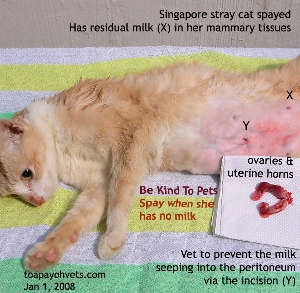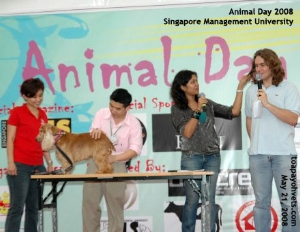DUMB IDEAS IN ANIMAL ACTIVISM - Case study
"Why don't you stay 2 weeks in The Animal Shelter (TAS)?" the animal activist raised his voice in reply as the lady across the dining table asked why there was no visitor's accommodation in TAS. We were having dinner on a fine evening on Saturday, April 26, 2008 and were having a happy conversation.
The lady had blurted out something like this: "My friend's son enjoyed his stay and experience in a monkey sanctuary in Brazil. He even helped to pick up the monkey pool. TAS ought to build a similar facility for visitors."
I thought a visitor's accommodation was an excellent idea
to raise funds for TAS. I
had mentioned this concept sometime ago. The animal
activist
patiently told me that TAS could be get sued if a dog bites the visitors.
During one of my visits, a visitor got bitten
in her leg by one of the free ranging dogs.
I had thought that this concept was an
excellent way to provide a hands-on
interaction
between prospective donors and animals. It creates a
contact point and market awareness
of the good work done in caring for so many homeless and
previously abused/abandoned dogs and cats that would
otherwise be dead by euthanasia or killed.
Did this lady in her late forties raise dumb ideas to provoke
such a reaction from the animal activist?
On the way back home in the car, I asked this lady to
elaborate.
She had the following opinions and feedback:
1. Tea parties and calendar sales will not raise the
funds needed.
2. The TAS website has no new information.
3. Blogs and other
network websites to inform prospective donors are important for the younger generation.
Occasional newsletters cannot reach a wider audience.
4. A wealthy well connected person (name given) can be
asked to provide funds to build the visitor's facility.
5. Patrons of the visitor's facility may be
veterinarians. Now, I had never thought of that.
"Veterinary undergraduates definitely will be interested
in animal shelter medicine and surgery," I said.
Some of the lady's suggestions seem out of reality.
As for the construction of the
visitor's facility,
this needs a person to spend time dedicated to its
construction besides fund raising. A formal and professional grant proposal
needs to be written. One cannot just ask for money from
wealthy and connected individuals or foundations
nowadays.
I read this book "Three Cups of Tea". Greg Mortenson, an
American humanitarian who had this concept of building
schools for poor Pakistanis when he was in his late
twenties. He
wrote to around 500 wealthy people and organisations in
the U.S.
He
got one reply and that US$12,000 grant from a wealthy
individual enabled him to build the first schools to
educate the poor children in Pakistan.
I could not find much info about the
Brazil's monkey sanctuary but there is a 40-year-old
chimp rehabilitation centre in Gambia. It is the
Chimpanzee
Rehabilitation Trust. It took the some 40 years
before the founder agreed to the building of Badi Mayo
(4 safari tents, 8 visitors) in 2006. Visitors are not
allowed to contact the chimpanzees but to observe them
from a boat.
As for TAS, dogs and cats will love human contact. Visitors
given accommodation will have more them to bond with the
animals.
It will be a two-way exchange of love and knowledge for
the urban-raised
children who have never gone near a chicken. One Myanmar
travel agent once said to me: "When Singaporeans visit
Myanmar, they get so excited when they see ducks and
farm animals. Myanmar people grow up seeing them
everywhere."
As for veterinarians as
patrons of the visitor's facilities, it may be possible
to link with a
University Veterinary Department in Australia. The University provides update information
on shelter management and let their professors and students learn more
about tropical canine and feline health and see practice in
the TAS. There are some universities in the U.K. whose vets
work closely with animal shelters in Africa. An example
is the University of Liverpool helping the
Gambia
Horse and Donkey Trust in the management of horses
and donkeys and receiving important veterinary knowledge
of the diseases of such animals.
Dumb ideas from some outsiders are precious feedback for
a company to innovate and grow.
The
reality is often so much different but without dumb
and difficult questions, most non-governmental organisation
(NGO) will become fossilised as it continues its old
practices.
The reality is that the NGO needs funds from private
individuals to sustain its growth
over the years. Well connected wealthy
individuals may be found to build the visitor's
facility but some volunteers have to write and justify
the grant and this takes time, follow up and motivation.
Direct contact will be the best. Gerald Durrell
personally got Princess Grace Kelly to be the patron of
one of his zoo projects, according to his biography.
Dumb ideas are precious feedback but knowing which ones
can be executed and benefit any organisation can make
the difference between sustainable growth or bankruptcy
of the NGO.
Yet this lady had lots of ideas to help TAS to raise funds.
"Dumb ideas" are what leaders may need to sustain the
growth of their venture but they can raise emotions to a
very high level in passionate animal activists.
I met the lady later.
She suggested growing plants for sale to raise funds for
the TAS. More ideas from her. The monkey reserve was
actually not in Brazil but in Bolivia. I suggested that
she execute her ideas rather than propose them as some
of her ideas might not be practical and might stress out
others.
Once I had an idea of raising goats for sale to raise
funds for the TAS as there were some grassland. Fence up
an area and raise goats inside the fencing so as to
protect them from being bitten by the free-ranging dogs.
When the grass has been eaten by the goats, move the
fences to another plot. Something like rotation farming.
Therefore grass cutters are not needed and a continued
source of revenue for the TAS. Is it a dumb idea from an
ivory-tower vet?
Animal activism needs
passionate hands-on volunteers who can execute their
ideas to the final stage. Do "Arm-chair" critics have a
place in animal activism? Are their contribution of dumb
ideas from an outsider's point of view coming on too
strong in some cases?
If they have the financial
resources to execute their ideals, their dumb ideas may
be more palatable in
making the world a better place for homeless animals. But
in the end, results count.
Passion, hands-on execution and performance are what
count in being successful in animal activism.
Note: TAS is a non-existent animal shelter in this case study.




